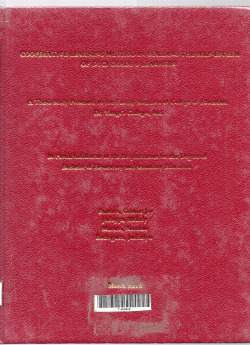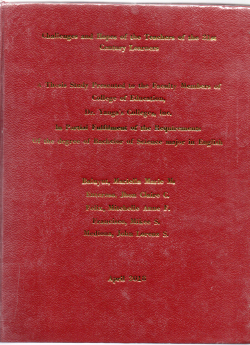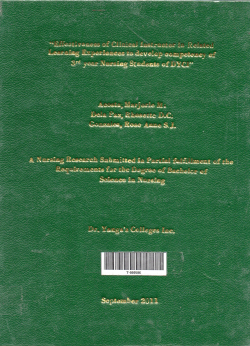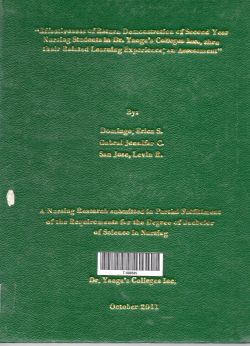THE IMPLEMENTATION OF INTERB ELATED TASKS IN LEARNING METAPHYSICAL CONCEPTS FOR GRADE 1 LEARNERS
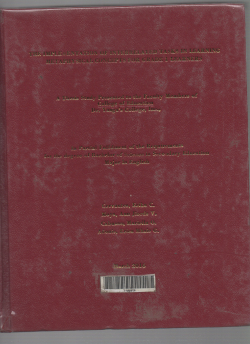
Type
Thesis
Authors
Category
COED
[ Browse Items ]
Subject
Grade 1 learners
Abstract
Grade 1 elementary school is a crucial year among learners as it advocates the
basic preparation to mold holistic citizens of the fhture. As young learners, it is
significant that these years shall be the beginning of training for permanence of skills, as it aims for continuous development However, this shall not only focus on the academic skills of a learner, but the acquisition of metaphysical concepts, identified in this research as values, shall also be tapped. With the deteriorating situation in the society, refining values again seemed to be a need The researchers intends to modify the discipline that caters values education among learners, which is Edukasyon sa Pagpapakatao, thus, a quasi-experimental research was utilized. With the concept that Grade 1 elementary school students are more on concrete and sensual learning, and are engaged with coping in the society in order to prevent punishment, the researchers decided to implement Interrelated Tasks which are perceived to improve their understanding about these concepts Within the two-month intervention, the researchers determined the significant difference between the Traditional Method for a class, and the implementation of Interrelated Tasks for the other. Interrelated Tasks are classified role plays, simulations, games and hands-on activities, which are not just confined on the value that is being discussed for a certain month, but are also aligned to the situations which are expenential to the learners’ part This new implementation was compared with the Traditional Method — the teaching approach of the usual Edukasyon sa Pagpapakatao module for Grade 1 learners Love and Hope are the metaphysical concepts chosen because Love is a universal virtue, though usually stated as a form of emotion, this virtue only materializes . In actions and commitment; while Hope motivates a person to keep on going. Validated and reliable Likert-scale questionnaires were utilized to determine its significant difference, as results were analyzed based on the participants’ profile and intervention group every month. Correspondingly, the researchers observed the learners’ behavior as a finale. The implementation also highlighted the themes which learners went through before coming up with the target action to show such a metaphysical concept, which are:
Recognizing Relations, tells how familiar the participants are to the people around them, Bridging Bonds, conveys establishment of deeper relationships, and Acknowledgement of the Action shows the indication of the concept’s action The researchers gained a Zscore Value of 2.682 for Love, and 2.694 for Hope — both with a Z-Critical Value of 2 58, in which mean scores from the Interrelated Tasks intervention scored higher than the Traditional Method. As the intervention concluded, the researchers established findings that the implementation of Interrelated Tasks is an aide to increase the level of understanding of metaphysical concepts for Grade 1 Learners. In addition, it emphasized that proper identity of roles and personal connections of the learner to other people has to be done, as per one of the themes - Bridging Bonds, in order to ensure an expectation of a manifestation of a target action of the metaphysical concept.
basic preparation to mold holistic citizens of the fhture. As young learners, it is
significant that these years shall be the beginning of training for permanence of skills, as it aims for continuous development However, this shall not only focus on the academic skills of a learner, but the acquisition of metaphysical concepts, identified in this research as values, shall also be tapped. With the deteriorating situation in the society, refining values again seemed to be a need The researchers intends to modify the discipline that caters values education among learners, which is Edukasyon sa Pagpapakatao, thus, a quasi-experimental research was utilized. With the concept that Grade 1 elementary school students are more on concrete and sensual learning, and are engaged with coping in the society in order to prevent punishment, the researchers decided to implement Interrelated Tasks which are perceived to improve their understanding about these concepts Within the two-month intervention, the researchers determined the significant difference between the Traditional Method for a class, and the implementation of Interrelated Tasks for the other. Interrelated Tasks are classified role plays, simulations, games and hands-on activities, which are not just confined on the value that is being discussed for a certain month, but are also aligned to the situations which are expenential to the learners’ part This new implementation was compared with the Traditional Method — the teaching approach of the usual Edukasyon sa Pagpapakatao module for Grade 1 learners Love and Hope are the metaphysical concepts chosen because Love is a universal virtue, though usually stated as a form of emotion, this virtue only materializes . In actions and commitment; while Hope motivates a person to keep on going. Validated and reliable Likert-scale questionnaires were utilized to determine its significant difference, as results were analyzed based on the participants’ profile and intervention group every month. Correspondingly, the researchers observed the learners’ behavior as a finale. The implementation also highlighted the themes which learners went through before coming up with the target action to show such a metaphysical concept, which are:
Recognizing Relations, tells how familiar the participants are to the people around them, Bridging Bonds, conveys establishment of deeper relationships, and Acknowledgement of the Action shows the indication of the concept’s action The researchers gained a Zscore Value of 2.682 for Love, and 2.694 for Hope — both with a Z-Critical Value of 2 58, in which mean scores from the Interrelated Tasks intervention scored higher than the Traditional Method. As the intervention concluded, the researchers established findings that the implementation of Interrelated Tasks is an aide to increase the level of understanding of metaphysical concepts for Grade 1 Learners. In addition, it emphasized that proper identity of roles and personal connections of the learner to other people has to be done, as per one of the themes - Bridging Bonds, in order to ensure an expectation of a manifestation of a target action of the metaphysical concept.
Description
Hope
Number of Copies
1
| Library | Accession No | Call No | Copy No | Edition | Location | Availability |
|---|---|---|---|---|---|---|
| Main | 626 | T C3373 2016 | 1 | Yes |
